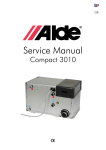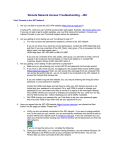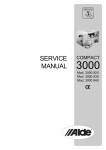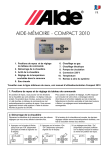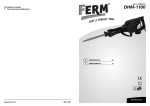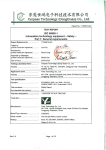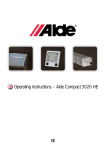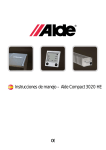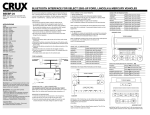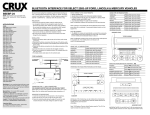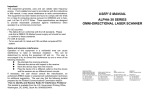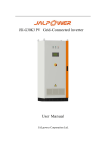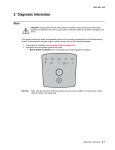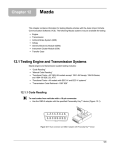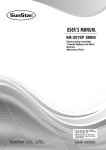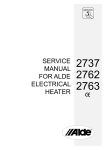Download Service Manual
Transcript
GB Service Manual Compact 3000 92x 93x 94x Foreword This service handbook is intended to assist with servicing and fault-finding in caravans and motor caravans equipped with the Alde Compact 3000 92x-94x. The handbook may also be of assistance in ordering spare parts. It also provides general information on how Alde central heating systems are designed, and how they operate. When servicing components designed for LPG and 230 volts, national safety regulations must be adhered to. After the boiler has been serviced, the service record must always be completed. Alde International Systems AB Service department NB! We reserve the right to make changes after this handbook has been printed. CONTENTS Page Chap 3 1:0 4 1:1 5 2:0 5 2:1 6 3:0 6 3:1 7 3:2 7 3:2:1 7 3:2:2 8 3:2:3 8 3:3 9 3:4 9 3:5 9 3:6 9 3:7 9 3:8 10 4:0 10 4:1 10 4:2 Page Chap 11 4:3 11 4:4 11 4:5 12 4:6 13 4:7:1 14 4:7:2 15 4:8 15 4:9 16 4:10 16 5:0 17 6:0 18 6:1 19 6:2 19 6:3 20 6:4 21 6:5 21 6:6 22 7:0 23 7:1 24 8:0 25 9:0 26 9:0 About the Alde central heating system Care of the heating system About the Compact 3000 Technical data Fault-finding The electrical heating cartridge does not work The LPG boiler do not start The LPG boiler shuts down on start-up No ignition spark Ignition spark is generated but the boiler does not start The LPG boiler starts but goes out after approx. 10 seconds The LPG boiler starts and switches off at short intervals Noisy fan Noisy burner Unstable or violent ignition Other technical information Replacing components Replacing the printed circuit board Replacing fan Replacing a burner (new model) Replacing the spark electrode Replacing the flame sensor Replacing the solenoid valve Replacing a 1 kW heating cartridge Replacing a 2 kW heating cartridge Replacing the operating thermostat Replacing the overheating protection device Replacing the pressure switch Safety check Wiring diagram with control panel 3000 266 Wiring diagram with control panel 3000 380 Wiring diagram for 3000 465 Wiring diagram for 3000 465 (with auxiliay functions) Wiring diagram for 3000 565 (with auxiliay functions) Circuit diagram 12 V and 230 V~ Flow chart 230 V~ Exploded diagram Article numbers for exploded diagram Faultfinding Compact 3000 Spare parts Spare parts 1:0 ABOUT THE ALDE CENTRAL HEATING SYSTEM The central heating system uses two or three heat sources – an LPG boiler and a 230 volt electrical heating cartridge, as well as an externally-fitted heat exchanger for motor caravans. The LPG boiler/heating cartridge heats up a liquid mixture consisting of water (60%) and glycol (40%). With the aid of a 12-volt circulation pump, which is located in an expansion vessel, the warm glycol/water mixture is circulated round the system through pipes and radiators. Roof vent Window Air intake Flue Radiator The radiators, which are fitted along the outer walls, heat up the air, which rises and warms the walls and furniture. As the warm air rises, it forms an air-barrier which keeps the cold away from the windows. The temperature inside the caravan is controlled by a 12 volt thermostat on the control panel. Radiator LPG boiler Compact 3000 Heat exchanger 2968 1:1 Maintaining the heating system Adding liquid: Check the heating system’s fluid level regularly in the expansion vessel. The level should be approximately 10 mm above the ”min” mark when the system is cold. The heating system should be filled with a mixture of water and glycol. For preference, use high quality pre-mixed glycol (with inhibitor) intended for use in aluminium heating systems. If using concentrated glycol, the mixture should consist of 60% water and 40% glycol. If the heating system will be exposed to temperatures below –25°C, the glycol content must be increased, but not to more than 50%. Any vessels used in handling the liquid must be spotlessly clean, and the pipes in the heating system must be free of contamination. This will prevent the growth of bacteria in the system. The glycol mixture should be changed every second year, since its ability to protect against corrosion, for example, will deteriorate. The glycol content should be checked before topping up with new liquid. This will ensure that the concentration of glycol in the mixture is not too high. If the fluid level in the expansion tank falls for reasons other than evaporation, check all joints, drain cocks and bleeder screws to ensure that they are not leaking. If the glycolwater mixture leaks out, rinse with water and wipe up. Never allow the heating system to stand empty of glycol fluid. Ensure that the vehicle is standing level, and check that the bleeder screws and drain cocks are closed. Release the plastic nut on the circulation pump, located on the expansion vessel, and lift out the pump. Pour the glycol mixture slowly into the expansion vessel, using a watering can. When the system is being filled, air-pockets may form, depending on how the pipe-system has been installed. A good indication that there is air in the system is when the heat only travels a few metres along the pipe from the boiler, despite the fact that the circulation pump is operating. To make refilling and bleeding easier, we recommend using the Alde filling pump which quickly both fills and bleeds the system automatically. Bleeding a caravan heating system (manually): The LPG boiler must be switched on and the circulation pump switched off. Start by opening the bleeder screws (please refer to the vehicle instruction book for their location). Leave them open until liquid escapes through the spout at the air screw. Switch on the circulation pump and let it run for a while. Check whether the pipes and radiators all around the caravan are warm. If air still remains in the system, try the following: The LPG must be switched on and the circulation pump switched off. Lower the front of the caravan as far as possible using the jockey wheel. Leave it in this position for several minutes, to allow any air to rise to the highest point in the system. Open the bleeder screw at the highest point and keep it open until all the air has escaped. Raise the front of the caravan as high as possible using the jockey wheel, and repeat the process. Return the caravan to a horizontal position and start the circulation pump. Check that the heat is circulating all around the caravan. When bleeding a bogey wagon or a motor caravan, it is easier to park on a steep slope, or raise the vehicle using a jack. Filling pump Art no. 1900 811 2:0 ABOUT THE Compact 3000 How the boiler works. The set-up of the boiler When the room thermostat calls for heat, i.e. the temperature in the vehicle is lower than the set room temperature, the circulation pump starts. The liquid in the heating system then starts circulating, and cold liquid enters the boiler. The boiler’s operating thermostat senses that the temperature of the liquid is too low. A signal is sent to switch on the fan. When the pressure in the pressure switch is sufficiently high, a signal is sent to the electronics box to generate an ignition spark and to open the solenoid valves to allow gas to enter the system. Once the temperature in the vehicle has reached the temperature set on the room thermostat, the circulation pump stops. The operating thermostat senses that the liquid has reached the right temperature and the boiler is switched off. When the temperature of the liquid has fallen a few degrees again, the boiler restarts. This ensures that there is always hot liquid available when the room thermostat calls for heat, and that the fresh water in the boiler is always warm. An electrical heater works in the same way, but the signal from the thermostat is sent to the relays which start the electrical cartridges. The boiler consists of three eccentrically-fitted pipes. The innermost pipe is a heat exchanger made from extruded aluminium. This is surrounded by a water jacket containing a 40% glycol mixture which is the fluid for the heating system. The fresh-water heater is located outside the water jacket. The two outer pipes, as well as their ends and connections, are made from stainless steel. The heat exchanger is divided into two semi-circular parts by a u-shaped baffle plate. The burner is located in the upper semi-circle, the combustion chamber. The baffle plate leads the flue gases back into the lower part of the section, which constitutes the convection part. The burner unit is fitted on the end of the heat exchanger. It consists of a combustion fan, burner, solenoid valve with built-in relief valve and intake/exhaust connections. The exhaust gases escape through the inner tube, and fresh air enters through the outer tube. The exhaust fumes exit the vehicle via a hose and flue fitted either to the roof or to the wall. Fresh air enters via the same flue (balanced draft). 2 or 3 electrical heating cartridges are fitted to the upper part of the water jacket. The output of the cartridges Electronics is either 2x1 kW or 3x1 kW Thermostat box (alt. 2+1 kW), depending on boiler model. Overheating Water jacket, glycol mixture Hot water jacket, fresh water protection Electrical heating cartridges Pressure switch Fan Burner Solenoid valve 2:1 TECHNICAL DATA Liquid volume / Pressure Liquid volume, glycol mix: Liquid volume, fresh water: Max pressure, heating system: Max pressure, fresh water: Measurements: Height Width Depth Boiler size: 300 mm 345 mm 490 mm Rec. Min. install. dimensions.310 mm 400 mm 550 mm Weight: 6,5 kg Gas: Gastryck: I3+ 28-30/37 mbar, I3B/P 30 mbar, I3B/P 50 mbar Output, Propane: 5,2 kW Output, Butane: 6,0 kW Consumption, Propane: 380 g/h Consumption, Butane: 430 g/h 4,1 liter 8,4 liter 0,5 bar 3,0 bar 230 V ~ Output electrical cartridge (2 kW): 1050+1050 W Output electrical cartridge (3 kW): 1050+1050+1050 W 12 V DC Current consumption: Fuse: 1 amp (max) incl. circ. pump 2 amp BE AWARE OF THE RISKS OF 230 V DURING ALL SERVICE WORK 3:0 FAULTFINDING Fig 1. 3:1 THE ELECTRICAL HEATING CARTRIDGE DOES NOT WORK Cause: - Check that the changeover switches on the control panel are in the correct positions (see operating instruction for boiler). - The 12 V fuse has blown. - No or low voltage to the boiler. (< 12 V). - 230 volt not connected. - The overheating protection device has been triggered. - The thermostat is broken/damaged - Damaged printed circuit board. - Damaged electrical heating cartridge. - Faulty wiring or wire connections. B C A Fig 2. Action: During faultfinding, the hot water switch must be in the ON position and the power plug switched to 2 or 3 kW on the control panel. - Check that the 12 V fuse (see fig. 1 A) is intact. - Measure the input voltage. It must be no lower than 10.8 V. - Check that the 230-volt cable is connected and that the vehicle is connected to a 230-volt outlet. - Check that the overheating protection device has not tripped. If necessary, reset by first unscrewing the black protective cap, then pressing down the reset button (see fig. 1 B). When the overheating protection device has been reset, there must be a 12-volt input on one flat-pin terminal and 12-volt output on the other (see fig. 2 A), otherwise it is defective and must be replaced. N.B! If the overheating protection device has tripped it cannot be reset until the boiler has cooled 10-20°C. Before the boiler is restarted, check that it has been bled thoroughly. - Check that the operating thermostat is turned to the maximum clockwise position (see fig. 1 C). - Check that there is voltage (12 V) on flat-pin terminal 12 (grey cable, low temperature) and terminal 22 (blue cable, high temperature), see fig. 2. If there is no voltage on terminals 12 and 22, but there is voltage on terminal 11 (red cable), the operating thermostat must be replaced. - Check that there is voltage on pos. 9 on the P1 printed circuit board (see fig. 3). If not, the printed circuit board must be replaced. - Check that there is voltage on pos. 12 and 15 on the P1 printed circuit board (see fig. 3). If not, there is a fault in the wiring or on the control panel. - Check the resistance of the electrical heating cartridge (approx. 50 ohm for 1 kW, and 25 ohm for 2 kW) and the insulation to earth (> 1 Mohm). In the event of a fault, replace the cartridge. - Check that the wiring connections are intact and correctly fitted. - If none of the above measures solves the problem, replace the printed circuit board. The fault will lie in the control relays for 12/230 volts. A Grey 12 Blue 22 Red Red 11 Fig 3. 9 12 15 3:2 THE LPG BOILER DOES NOT START When the overheating protection device has been reset, there should be a 12-volt input on one flat-pin connector, and a 12-volt output on the other (see fig. 2 A), otherwise it is defective and must be replaced. The overheating protection is broken if there is 12 volt on only one cable. NB! If the overheating protection device has tripped, it cannot be reset until the boiler has cooled by 10-20°C. Before the boiler is restarted, check that it has been bled thoroughly. - Check that the operating thermostat is turned to the maximum clockwise position (see fig. 1 C). Initial check: - Disconnect the ignition cable from the electronics box and start the boiler. The electronics box should make a clicking sound for about 10 seconds. If you can hear the clicking, continue to section ”3:2:3 Ignition spark is generated but the boiler fails to start”. 3:2:1 THE LPG BOILER SHUTS DOWN ON START-UP ”Red LED comes on immediately” Cause: continue page. 8 - Resetting time too short. - The pressure switch does not cut out. - Fault in electronic ignition unit. - Faulty wiring. - Faulty printed circuit board. Fig 4. Action: - Reset the electronic ignition unit by switching off the boiler on the control panel (the red LED goes out) and wait at least 30 seconds before attempting a restart. - Check that the pressure switch cuts out. There should be 12 V on the white cable, connection no.1 on the pressure switch (fig. 4 A). If there is no voltage, replace the pressure switch. - Replace the electronic ignition unit - Check that the wiring connections are intact and correctly fitted. - Replace the printed circuit board with a new one. B A Fig 5:1. Hose fitting on press-cast burner housing (shiny, smooth surface) 3:2:2 NO IGNITION SPARK Cause: - Check that the changeover switches on the control panel are in the correct positions (see the boiler operating instructions. - The 12 V fuse has blown. - The overheating protection device has tripped. - The red LED on the control panel is lit (shut-down).. - No or low voltage on the boiler (< 12 V). - The operating thermostat is broken/damaged. - The pressure generated by the fan is too low. - The pressure switch does not come on. - The printed circuit board is damaged. - Faulty electronic ignition unit. - Faulty wiring. Fig 5:2. Hose fitting on sand-cast burner housing (dull, rough surface) Action: - Check that the 12 V fuse (see fig. 1A) is intact. - Reset the electronics by switching off the boiler on the control panel (the red LED light goes out) and wait approx. 20-30 seconds before attempting to restart. If the red LED comes on again, please refer to section ”3:2:1 The LPG boiler shuts down on start-up”. - Check the incoming voltage, is must be no lower than 10.8 V. - Check that the overheating protection device has not tripped. If necessary, reset by first unscrewing the black protective cap, then pressing the reset button (see fig. 1 B). - Remove the nozzle and blow the nozzle and gas pipe clean. - Check the wiring contact points again. - Check that the exhaust cowl and the intake/exhaust hoses are free from objects that may obstruct the air supply. - Check that there is voltage (12 V) on flat-pin terminal 12 (grey cable, low temperature) and terminal 22 (blue cable, high temperature) see fig. 2. If there is no voltage on terminals 12 and 22, but there is voltage on terminal 11 (red cable), the operating thermostat must be replaced. - Check that the hoses (fig. 5:1 or 5:2) between the fan housing and pressure switch are intact and correctly fitted. - Check that the voltage to the fan is at least 9 volts +/-0.2 and that no abnormal noise can be heard. At 9 volts, the current consumption shall be approx. 0,4-0,6 A. In the event of a fault, change the fan. - Check that the pressure switch is making a clicking noise 2-5 seconds after the fan has started, or check that there is voltage on the flat-pin terminal of the blue cable, connection no. 2 (see fig. 4 B). - If the fan does not start, check that there is 12V in both the red and white cables. If there is 12V only in the red cable, the pressure switch should be replaced. - Check that the wiring connections are intact and are correctly fitted. - Replace the electronic ignition unit. If this has no effect, replace the printed circuit board. Spark electrode Flame sensor 2,5-3,5 mm Fig 6. 3:2:3 IGNITION SPARK IS GENERATED BUT THE BOILER DOES NOT START Cause: Spark electrode - No or poor gas supply. - No or faulty spark on the spark electrode. - The solenoid valves do not open. - Faulty soft start valve. - Faulty electronic ignition unit. - Nozzle blocked. - Faulty wiring. - Flue blocked. Flame sensor Action: - Check that the gas pressure to the boiler is correct (28-50 mbar). - Check that the ignition cable is intact and that there are no short-circuits along the cable - Check when starting that voltage is being supplied to the solenoid valves. If not, replace the electronic ignition unit - Check that a clicking sound can be heard from the solenoid valves. Check the valves one at a time by removing the flat-pin contacts. Replace if there is a fault. - Remove the soft start valve (see the exploded diagram) and attempt to restart. If the boiler now ignites, the soft start valve must be changed. (NB! The boiler ignites a little harder without the soft start valve). - Remove the burner and check that the spark electrode is intact and correctly fitted (see fig. 6). Replace if necessary. 3:3 THE LPG BOILER STARTS BUT GOES OUT AFTER APPROX. 10 SECONDS (RED LED COMES ON) Cause: - The flame sensor cable is damaged. - Faulty electronic ignition unit. - Sensor damaged or incorrectly positioned. Action: - Check that the flame sensor cable is intact and correctly connected. - The only way to check whether the electronic ignition unit is working is to change it and then check that the boiler is operating properly. - Remove the burner and check that the flame sensor is intact and correctly fitted (see fig. 6). Replace the flame sensor if necessary. 3:4 THE LPG BOILER STARTS AND SWITCHES OFF AT SHORT INTERVALS Cause: - Check that the flue is free from objects that may obstruct the air circulation. - Check that the gas pressure to the boiler is correct (28-50 mbar). - Where the ignition is unstable, remove the soft start valve and test-start the boiler. The start should now be stable, but with a more violent ignition than normal. Replace with a new soft start valve or clean the old one and carry out another test-start. - Unscrew the nozzle and check that it is marked ”230”. - Detach the ignition cable from the electronic ignition unit and start the boiler. A clicking sound should be heard from the electronic ignition unit, with a frequency of at least 2 Hz at 12 volts (two clicks per second). If the frequency is too low the ignition electronics must be replaced. - Check that the ignition cable is intact and that there are no short-circuits along the cable. - Remove the burner and check that the spark electrode is correctly fitted (see fig. 6) and undamaged. Replace/ adjust if necessary. - Using a leakage tester, for example, check that no gas is passing through the boiler when it is switched off. If a leak is discovered, check that all gas connections are tight. If there is no noticeable external leakage, replace the solenoid valve. - Voltage to boiler too low (< 12 V). - Poor contact point in the wiring (earth fault). - Pressure switch damaged or incorrectly connected. - Ignition unstable. - Flue blocked. Action: - Measure incoming voltage. It must be no lower than 10.8 V. - Check the wiring connections, particularly the earth connections. - Check that both hoses between the pressure switch and the fan housing are connected (see fig. 5). - Replace the pressure switch. - If the problem persists, please refer to ”Unstable or violent ignition”. - Check that the exhaust cowl and the intake/exhaust hoses are free from objects that may obstruct the air supply. 3:5 Noisy fan Cause: - The fan motor is damaged (worn). - Impeller out of balance. - Impeller touches fan housing. Action: 3:8 other technical information - Remove the fan and check whether the impeller has touched the fan housing (wear marks on the fan housing). If necessary adjust the fan housing axially. - Replace the fan. • The electronic ignition unit may emit a slight high frequency sound during operation. • Boiler models 3000 92x and 3000 93x are intended only for roof flues. • Boiler model 3000 94x is intended only for wall flues. • Boilers with manuf. no. 10921 and higher have circuit board rev C, which means that the fan does not start if the pressure switch is ”on”, and there is a new voltage stabilisation which handles lower voltages (10 V). • Boilers with manuf. no. 7536 and lower may have a fault in the fan that causes a whistling sound. • If there is a resonant noise on boiler model 3000 94x, insulate the exhaust hose with insulation hose art. no. 1900 233. • If the fuse (F2) has blown, the boiler should not be repaired but should be replaced with a new boiler. • Insulate the outer pin on the solenoid valve so that it cannot come into contact with the end plate. If this should happen, the electronics box short-circuits and must be replaced. • In order to simplify operation and maintenance, fitting automatic air bleeders on the installation can be recommended. 3:6noisy burner Cause: - Whistling sound from the burner on 92x-93x. Change to burner 3000 516. 3:7 UNSTABLE OR VIOLENT IGNITION Cause: - The exhaust/intake hoses are too short. - The exhaust/intake hoses are damaged or loose. - The exhaust cowl is blocked. - Incorrect gas pressure. - Blocked or faulty soft start valve. - Faulty nozzle. - Low spark frequency. - The pressure switch does not shut off or has stuck. - The solenoid valves are leaky. Action: - Check that the intake/exhaust hoses are at least 2 metres long and that they are undamaged and correctly fitted at the boiler and flue (if a wall flue is fitted, 0.7-1.5 m). 4:0 replacing components Always switch off 12 V DC and 230 V ~ power supply and turn the main gas cock to "off" position before starting any servicing. The seals (marked in red) must NOT be broken unless special permission has been obtained from Alde. 4:1Replacing the printed circuit 4:2 replacing fan board 1. Remove the cover and the service panel from the boiler. 1. Remove the cover and service panel on the boiler. 2. Detach the blue (N) (fig. 7 A) and brown (R) (fig. 7 B) cables at the cable ports on the printed circuit board, and remove the blue (N) (fig. 7 C), brown (R) (fig. 7 D) and red (R) (fig. 7 G) cables from the electrical heating cartridge. 3. Detach the white 15-point connection block (fig. 7 E) from the printed circuit board. 4. Remove the screw behind the connection block (fig 7H). 5. Remove the printed circuit board by pressing together the hooks on the 5 plastic spacers (fig. 7 F), and pulling out the circuit board. 6. Push the new board firmly into the spacers and connect the cables as shown in fig. 7. 7. Refit the service door and cover and test-run the electrical heating cartridge. 2. Disconnect the positive (red, fig. 8 A) and negative (black, fig. 8 B) cables on the fan motor. 3. Unscrew the plastic housing from the motor, 2 screws (fig. 8 C). (NB! On boilers with wall flues (94x) item 3 shall be ignored.) 4. Unscrew the 4 plate screws (fig. 9 C) securing the fan to the fan housing. 5. Tilting the fan towards the boiler body, lift it upwards out of the fan housing (see fig. 10). 6. Fit the new fan by following these instructions in reverse. NB! Take care not to damage the impeller when fitting the fan. 7. Fit the service panel and lid and test-run the boiler. (NB! In a small number of boilers, the gas pipe is fitted in such a way that the fan cannot be extracted without first removing the gas pipe. Do not forget to check that the seal is tight). Fig 7. Fig 9. C G A D F E F C B F C H Fig 8. Fig 10. B A C 10 4:3 replacing the burner NB! Items 9-12 shall be ignored on boilers with manufacturing no 3000 9xx B and on boilers where burner 3000 516 is installed. 9. Adjust the pressure switch screw 1/2 turn clockwise 10.Remove the as in item 4.2 and the under the inlet plate under impeller by removing the two screws. 11.Install the new inlet plate, and then put back the old one, two screws. 12.Remount the fan in reverse order. NB! Take care that the impeller does not get damaged during fitting. Check that the fan does not make an unpleasant noise. 13.With the boiler operating, check the system and connections for any leaks using a leak detector spray. Once this is done, fit the end plate and cover. Applies to boiler models 3000 927 and later. If the burner is replaced, burner 3000 516 should be installed. 1. Remove the cover and end plate from the boiler. 2. Detach the spark electrode and sensor cables from the electronic ignition unit. 3. Using two spanners, unscrew the nut on the gas pipe (fig. 11 A) between the burner and the solenoid valve (fig. 11 B). 4. Remove the end plate with burner by slackening the screws (fig. 11 C) on the burner housing. 5. Pull the end plate with burner straight out of the burner housing (fig. 12). 6. Fit the new burner (insert it straight in) and secure it via the end plate in the burner housing (fig. 11 C). 7. Secure the gas pipe to the solenoid valve (fig. 11 B) and to the burner (fig. 11 A). Remember to check that the cones are correctly fitted to the pipes. Using two spanners, tighten the nuts on the gas pipe to 7-9 Nm (fig 11). 8. Fit the ignition spark and flame sensor cables to the electronic ignition unit. 4:4REPLACING THE SPARK ELECTRODE When replacing the spark electrode, also replace the flame sensor. 1. Detach the burner as per instructions in 4:3. 2. Remove the nut (fig. 13 A) and pull the spark electrode (fig. 16 B) straight backwards. 3. Fit the new spark electrode and secure it. Check that the distance between the tip of the spark electrode and the mesh cover of the burner is 2.5-3.5 mm, and that the spark electrode is correctly positioned (see fig. 6). 4. Fit the burner in accordance with instructions and teststart the boiler. Fig 11. 4:5Replacing the flame sensor When replacing the flame sensor, also replace the spark electrode. B A 1. Detach the burner in accordance with 4:3. 2. Remove the nut (fig. 13 C) and pull the flame sensor (fig. 13 D) straight backwards. 3. Fit the new flame sensor, ensuring that the tip of the flame sensor is positioned above the burner in accordance with fig. 6. Secure the flame sensor. 4. Fit the burner in accordance with instructions and teststart the boiler. C Fig 12. Fig 13. A B C D 11 4:6 replacing the solenoid valve 3. Using two spanners, slacken the nuts on the incoming gas pipe (fig. 15 A) and the gas pipe to the burner (fig. 15 B), and remove the rubber cap from the soft start valve (fig. 14 D). 4. Detach the pressure switch hoses to and remove the insulation next to the burner housing. 5. Unscrew the two plate screws which fasten the gas valve angle bracket to the burner housing. 6. Extract the solenoid valve and transfer the angle bracket to the new solenoid valve (attached underneath with a screw). 7. Fit the new solenoid valve by following the instructions in reverse order. 8. Using two spanners, tighten the nut on the incoming gas pipe to 25-30 Nm, and the gas pipe to the burner to 7-9 Nm. Remember to check that the bevels are correctly fitted to the pipes. With the boiler operating, check the system and connections for any leaks using a leak detector spray. 9. Fit the end plate and cover. For boilers with serial no. from 04445 and upwards. 1. Remove the cover and end plate on the boiler. 2. Unfasten the cables (black, brown and yellow/green) on the solenoid valve (fig. 14 A-C). 3. Using two spanners, slacken the nuts on the incoming gas pipe (fig. 15 A) and the gas pipe to the burner (fig. 15 B), and remove the rubber cap from the soft start valve (fig. 14 D). 4. Extract the solenoid valve (fig. 16) and fit the new one by following the instructions in reverse order. 5. Using two spanners, tighten the nut on the incoming gas pipe to 25-30 Nm, and the gas pipe to the burner to 7-9 Nm. With the boiler operating, check the system and connections for any leaks using a leak detector spray. 6. Fit the end plate and cover. For boilers where the solenoid valve is fitted to the burner housing (up to serial no. 04444). 1. Remove the cover and end-plate on the boiler. 2. Unfasten the cables (black, brown and yellow/green) on the solenoid valve (fig. 14 A-C). Fig 16. Fig 14. D A B B C A Fig 15. A B 12 4:7:1 Replacing the 1 kW heating cartridge 1. 2. 3. 4. 5. 6. NB! Check that the rubber plug is fully inserted and push the lower edge of the heating cartridge while tightening the nut. Tighten the nut to 4 Nm. 11. Connect the cables according to fig. 20, (A=brown, B=blue, C=yellow/green). Fit the cover and end plate. Add glycol mixture. Bleed and test-run the boiler. Fig 17. Fig 19. Fig 18. Fig 20. Switch off 230 V power supply Drain the glycol mixture from the heating system. Remove the cover and end plate. Remove the fan in accordance with 4.2 Remove the cables from the heating cartridge. Slacken the nut in the centre of the electrical heating cartridge electrode (fig. 17). 7. Give the t-screw on the heating cartridge a one-quarter turn (fig. 18). 8. Extract the heating cartridge by pulling straight backwards (fig. 19). 9. Clean around the edges where the old heating cartridge has been located. 10.Then fit the new heating cartridge, give the t-screw a one-quarter turn and tighten the nut. NB! Before fitting the heating cartridge, check the direction in which to turn the t-screw. B C A 13 4:7:2 Replacing the 2 kW heating cartridge 1. 2. 3. 4. Switch off 230 V power supply Drain the glycol mixture from the heating system. Remove the cover and end plate. Remove the burner together with the solenoid valve (fig. 21). Do not slacken the gas pipe, this is in order to avoid having to check sealing. 5. Remove the cables from the heating cartridge. 6. Slacken the two plate screws and remove the supporting angle bracket from the heating cartridge (does not apply to boilers with serial numbers of 4445 or higher). 7. Slacken the nut in the centre of the electrical heating cartridge electrode and unscrew it approximately 10 mm (fig. 22) 8. Tap the nut lightly to release the rubber plug and extract the heating cartridge by pulling straight backward. If there is a T screw on the heating cartridge (the screw has a groove), the nut must be unscrewed sufficiently for the T screw to be turned a quarter turn before the heating cartridge can be pulled out. NB! Leave the nut on the screw, with several turns of thread in it. 9. Clean round the edges where the old heating cartridge was. Then fit the new heating cartridge. Before fitting it, check the direction of the T screw, push the heating cartridge in and turn the T screw a quarter turn. Then pull the nut so that the T screw comes into the correct position (the screw should be at the same height as the cable connections). Tighten to 4 Nm. Check that the T screw projects 15-18 mm from the nut (otherwise there is a risk that the T screw is not in the right position). 10.Any angle bracket should not be fitted. Fit the solenoid valve in accordance with the instructions. Connect the cables as shown in fig. 23 (A=brown, B=blue, C=yellow/ green, D=red). Fit the cover and end plate. Add glycol mixture. Bleed and test-run the boiler. Fig 21. Fig 23. Fig 22. A B C 14 B D 4:8Replacing the operating thermostat 4:9 Replacing the overheating protection device 1. Remove the cover on the boiler. 2. Remove the locking clip (fig. 24 A). Remove the split pin (fig. 24 B) on the immersion pipe. Remove the overheating protection device sensor first (fig. 25), and then the operating thermostat sensor (fig. 26 A). 3. Unscrew the two screws which secure the operating thermostat (fig. 27 A) to the fastening plate, and remove the cables from the flat-pin connections. 4. Transfer the contact spring (fig. 26 B) to the new operating thermostat. The spring must be fitted with the rear end of the bulb uppermost, so that it pushes the sensor downwards into the immersion pipe. 5. First insert the operating thermostat sensor all the way to the very end of the immersion pipe. Then insert the overheating protection device sensor as far as possible. Fit the split pin on the immersion pipe. 6. Attach the operating thermostat to the service panel (NB! Use the original screws only) and connect the cables in accordance with fig. 2 (blue, grey and two red). 7. Fit the cover and test-run the boiler. 1. Remove the cover on the boiler. 2. Remove the locking clip (fig. 24 A). Remove the split pin (fig. 24 B) on the immersion pipe and take out the sensor (fig. 25). 3. Remove the black plastic cap and unscrew the nut (fig. 27 B) which holds the overheating protection device to the service panel. Release the cables (fig. 2 A) from the flat-pin contacts and change the overheating prote tion device. 4. Fit the new overheating protection device by following the instructions in reverse order. Test-run the boiler. Fig 24. Fig 26. A B A B Fig 25. Fig 27. A B 15 4:10Replacing the pressure switch 5:0 1. Remove the cover and end-plate from the boiler. 2. Detach the blue, white and red cables on the pressure switch. 3. Push back the metal securing plate and pull out the pressure switch (fig. 28 A). 4. Detach the rubber hoses (fig. 28 B) from the pressure switch (do not pull the hoses, unscrew them). 5. Refit the hoses to the new pressure switch before pushing it into place. 6. Fasten the pressure switch and fit the cables to the flatpin contacts in accordance with fig. 28. 7. Fit the cover and end plate to the boiler. Test-start the boiler. The safety check must be carried out after every service. Safety check Check: • That the intake/exhaust hoses and flue are tight and undamaged. • That the LPG pipes are tight. Pressure test the system. • That the 230 V~ earth cable is connected. • That the safety valve on the water heater is not blocked. • That the heating system is filled with glycol mixture up to the mark on the expansion vessel. Fig 28. A Blue Red White B 16 6:0 wiring diagram with control panel 3000 266 17 6:1 wiring diagram with control panel 3000 380 18 6:2 wiring diagram with control panel 3000 465 6:3 wiring diagram with control panel 3000 465 (with auxiliary functions) 19 6:4 wiring diagram with control panel 3000 565 (with auxiliary functions) 20 6:5circuit diagram 12V and 230 V ~ 6:6 Flow chart 230 V ~ 21 7:0 exploded diagram 1 2 47 6 54 53 2 52 7 4 7 6 5 51 3 8 9 10 13 11 8 12 55 50 19 18 16 17 25 23 22 24 43 29 30 31 56 42 41 21 28 49 47 46 2 33 40 39 38 32 37 34 35 36 2 22 20 27 48 45 44 14 2 26 47 15 7:1 Article numbers for exloded diagram 1. 3000 133 2. 2900 258 3. 3000 195 3000 452 3000 409 4. 3000 247 5. 3000 372 6. 3000 297 7. 3000 324 8. 2930 414 9. 3000 196 10. 3000 196 11. 3000 196 12. 3000 196 13. 3000 138 14. 3000 168 15. 3000 289 16. 3000 278 17. 2737 174 18. 3000 256 3000 250 3000 315 3000 255 19. 3000 240 20. 3000 159 21. 3000 528 22. 3000 204 23. 3000 213 24. 3000 206 25. 3000 501 26. 3000 205 27. 3000 383 28. 2930 235 29. 3000 407 30. 3000 516 31. 3000 127 32. 3000 362 33. 3000 365 34. 3000 185 35. 3000 246 36. 3000 132 37. 3000 231 38. 3000 232 39. 3000 157 40. 7410 325 41. 3000 286 42. 2762 125 43. 3000 351 44. 3000 131 45. 3000 261 46. 3000 330 3000 333 3000 334 47. 3000 367 48. 3000 184 49. 3000 327 50. 4071 011 51. 3000 460 52. 3000 251 53. 2959 120 54. 3000 290 55. 3000 143 56. 3000 166 Metal cover Self-tapping screw B6 x 9.5 Fan compl. (for 921) Fan compl. (for 92x and 93x) Fan compl. (for 94x) Insulation Double clip Rubber cap Double clip Sleeve Rubber hose, L=190 mm Rubber hose, L=55 mm Rubber hose, L=330 mm Rubber hose, L=110 mm T-piece Soft start valve Solenoid valve compl. Gas pipe Screw M4x8 Electrical heating cartridge 1 kW Electrical heating cartridge 2 kW Electrical heating cartridge 3 kW Blind plug for electrical heating cartridge Plug Pipe Nozzle compl. End plate Gasket Flame sensor Burner Spark electrode Nut Cable grommet 23 Ignition kit compl. Burner compl. ”SIT” pressure switch Overheating protection device compl. Operating thermostat compl. Casing Insulation Front end plate Grommet Plastic spacer Electronic ignition unit Self-tapping screw 2.9x25 Mains supply cable Cable clamp Service panel Rear end plate Insulation Printed circuit board (for 921) Printed circuit board (for 3 kW heating cartridge) Printed circuit board (for 2 kW heating cartridge) Wiring loom for 230 V Wiring loom Spring Retaining clip Boiler body compl. Insulation T-piece Pressure relief valve Pipe Fuse 2 A 8:0guide for fault finding on Compact 3000 Guide for faultfinding on Compact 3000 Neither electricity nor gas working Yes No Only gas not working Yes No Is the pump working Only electricity not working Red lightemitting diode lit Is the fan working No Yes Yes Is the fan working Voltage 8.8-9.2 V Current 0.4-0.6 A Yes No Voltage (230 V) No Yes Hoses Overheating protection Fuse (2A) Circuit card (Re 2, 3, 4) Pressure switch does not return Ignition electronics (click in gas valve) (ignition spark) Pressure switch (blue cable) Thermostat Circuit card (Re 7) Circuit card (Thermal fuse 88º C) Panel Sparking plug Panel Sensor pin Gas supply Panel 24 No Voltage fan 8,8-9,2 V Yes No Fan Pressure switch (white cable) Circuit card (Re 5) Panel 9:0spare parts 1 1 2 2 1. 3000 452 2. 3000 409 Fan complete (9 V for 3000 92x-93x) Fan complete (9 V for 3000 94x) Packed in cardboard box with Allen key for impeller 1. 3000 289 Solenoid compl. inc. soft start valve 2. 3000 168 Soft start valve. 3000 516 Burner set including throttle plate (Replaces earlier models 3000 385, 3000 408 and 3000 444). 3000 407 25 Ignition kit incl. spark electrode, flame sensor, cable grommet and gasket (for all models) 9:0spare parts 1 1 2 2 1. 3000 333 2. 3000 334 1 Printed circuit board (92x-94x with 3 kW heating cartridge Printed circuit board (92x-94x with 2 kW heating cartridge 1. 3000 365 2. 3000 362 Operating thermostat ”lmit” including retaining clip Overheating protection device ”lmit” compl. 2 1 2 3 4 3 1. 2. 3. 4. 3000 127 3000 157 3000 471 3000 290 SIT” pressure switch Electronic ignition unit Hose nipple with in-built non return valve Pressure release valve 1. 3000 256 2. 3000 250 3. 3000 315 26 Electrical heating cartridge 1 kW Electrical heating cartridge 2 kW Electrical heating cartridge 3 kW 27 Wrangels allé 90 • Box 11066 • S-291 11 Färlöv • Sweden Tel +46 (0)44 712 70 • Fax +46 (0)44 718 48 • www.alde.se • [email protected] Service 3000 Rev 921 GB Alde International Systems AB




























